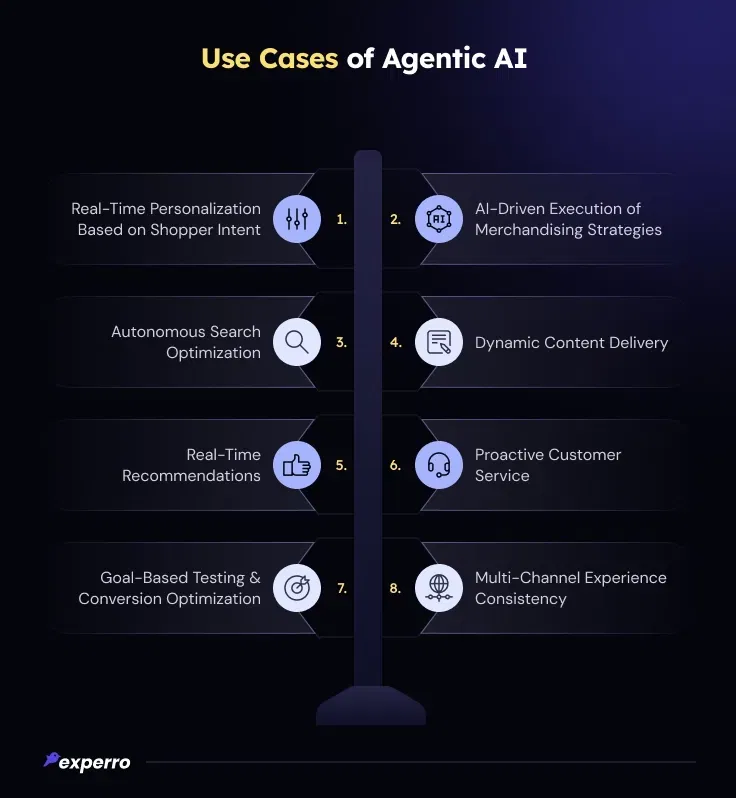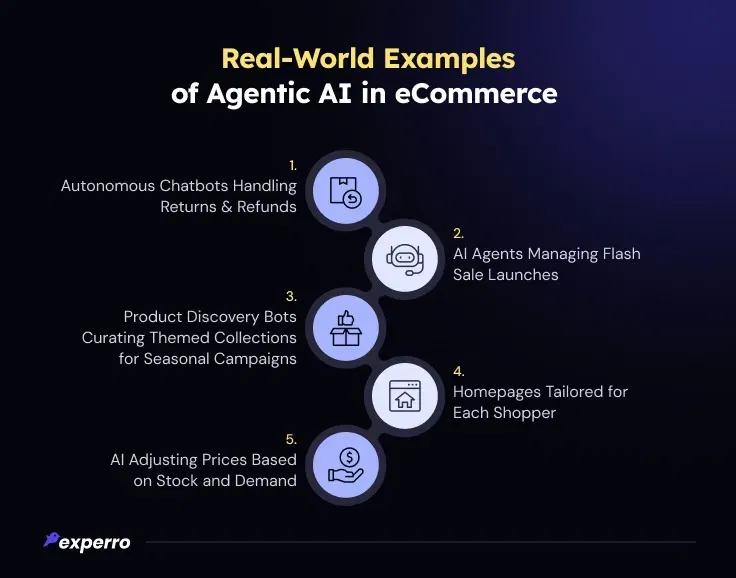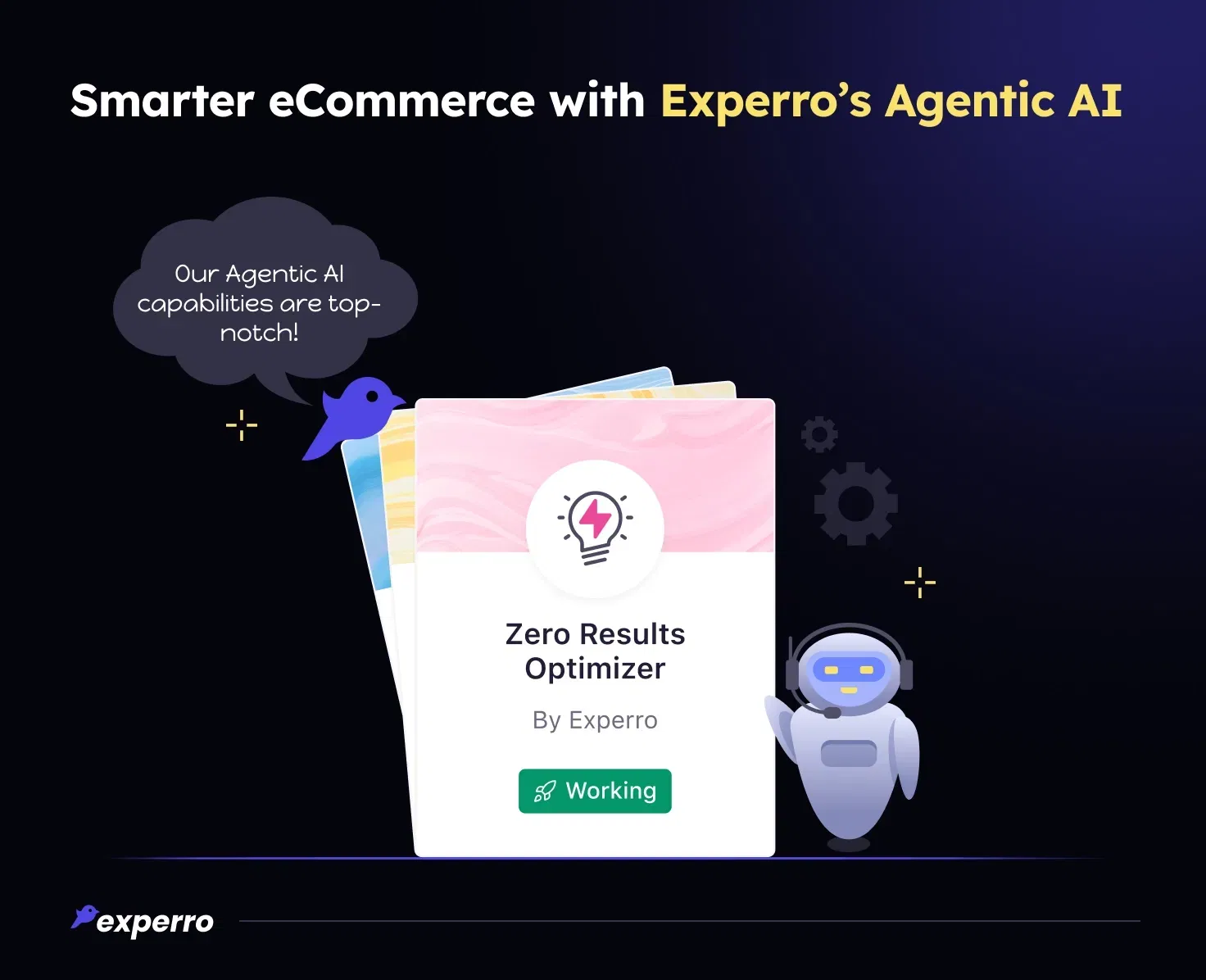- Blog
- Agentic Experience
- 9 min read
A Peek Into 8 Agentic AI Use Cases & Real-World Examples!
Published
9 May 2025Updated
2 September 2025

Key Takeaways
- The rise of agentic AI use cases in eCommerce is driven by intelligent automation and personalized engagement.
- AI agents optimize content, search, pricing, and merchandising autonomously across eCommerce platforms.
- These use cases help in driving smarter decisions, better customer experience, and scalable operations.
- Experro supports agentic AI use cases in retail with generative AI-powered search and personalization.
What if your eCommerce platform could automatically adjust prices, personalize content, and resolve customer queries (without human input)?
That’s the promise of agentic AI solutions—a transformative shift from passive algorithms to autonomous agents. These intelligent agents don’t just assist; they execute, learn, and optimize business operations in real-time.
From personalizing journeys to driving conversions, agentic experiences reshaping digital commerce. It moves beyond automation, delivering contextual experiences tailored to every micro-moment.
The shift is no longer optional for brands aiming to scale, it’s essential. Let’s dive deeper into the top agentic AI use cases revolutionizing eCommerce.
What Are the Top AI Agents Use Cases in eCommerce?
Agentic AI is reshaping how businesses interact with customers across the entire buying cycle.
From guided shopping to smart merchandising, here are the best use cases for agentic AI in the digital commerce space.

1. Real-Time Personalization Based on Shopper Intent
One of the most powerful agentic AI applications is enabling real-time, intent-aware personalization. Instead of relying on static segments, agentic AI for personalized shopping experiences tracks behaviors across sessions and channels to deliver hyper-relevant journeys.
Think of dynamic banners responding as shopper browses, or product suggestions aligning with evolving intent.
These AI agents can process vast contextual data like search terms, clicks, and cart actions—to guide users towards conversion paths. This makes agentic AI for customer journey automation not just a feature, but a strategic advantage in modern retail.
2. AI-Driven Execution of Merchandising Strategies
Personalized merchandising is no longer a manual art. With agentic AI for intelligent merchandising, AI agents can automate routine tasks like display rules, optimize product placements, and even create promotional bundles based on sales trends.
Emerging use cases of AI agents in 2025 include real-time monitoring of inventory, customer preferences, and competitor movements.
Instead of static curation, the storefront evolves continuously, offering visitors an optimized browsing experience. This is one of the agentic AI business use cases redefining how retailers can manage inventory and visual storytelling.
3. Autonomous Optimization of Onsite Search
As a result of gen AI-powered search, each customer interaction becomes smoother, offering personalized results in real-time.
Agentic AI for eCommerce search optimization empowers autonomous systems to refine customer query understanding using natural language processing and relevance ranking. These systems can also suggest synonyms or trending phrases to enhance search results.
Unlike traditional rule-based search, agentic AI systems can self-learn from shopper feedback and search patterns. This ensures higher accuracy, faster results, and more meaningful product discovery.
These are intelligent agent use cases in retail where AI reduces bounce rates and enhances satisfaction without manual input.
4. Dynamic Content Updates Across Pages and Campaigns
The way we approach personalized content has shifted; it’s now dynamic and continually evolving based on user interactions. Agentic AI for dynamic content delivery enables real-time updates across landing pages, banners, emails, and pop-ups based on user signals and campaign goals.
The use of an AI agent framework can tailor layouts, visuals, and CTAs to fit customer needs and timing automatically. For example, a first-time visitor might see a different homepage than a returning customer.
These agentic automation use cases ensure the content always feels fresh and personalized, increasing engagement and dwell time.
5. Real-Time Recommendations Powered by Predictive Analytics
Gone are the days of generic "Customers also bought" widgets. Agentic AI for personalized product recommendations adapts in real time based on context i.e. location, device, time of day, and even mood inferred from customer interactions and their browsing behavior.
These agentic AI practical applications understand micro-moments and respond instantly, helping shoppers feel understood.
Whether it’s upselling a luxury item or cross-selling accessories, this is among the agentic AI agents examples that directly impact basket size and result in improved customer satisfaction.
6. AI-Powered Customer Support with Minimal Human Involvement
AI agents for online store customer relationship management can anticipate issues before customers even raise them. From alerting about delays to offering automated refund solutions, AI shopping assistants reduce friction and human workload.
Agentic AI use cases in customer service also include handling FAQs, personalizing responses, and even escalating complex tasks with context.
These agentic AI assistants are boosting retention and trust by delivering fast, smart, and real-time support.
7. Goal-Based Testing and Conversion Optimization
Forget A/B testing with fixed variants. Agentic AI business applications enable continuous, goal-oriented experimentation. AI agents can test layouts and buttons, copy across user segments, and optimize based on live performance.
These agentic AI tools for upselling, cross-selling, and conversion rate optimization go beyond testing. In fact, they implement changes autonomously once goals are achieved.
As the industry shifts from data analysis to autonomous execution, these agile systems emerge as standout agentic AI use cases 2025.
8. Multi-Channel Experience Consistency Through AI Agents
Shoppers move across mobile, web, email, and even in-store touchpoints. AI agents in retail and eCommerce use cases are now focusing on delivering consistency across these channels.
From syncing offers to maintaining preferences, these applications of agentic AI technology ensure brand experience doesn't break across journeys.
73% of U.S. consumers use multiple channels during their shopping journey—and expect a consistent experience across all of them. Whether it's price consistency or saved carts, these agentic AI retail use cases unify the buyer's path and improve lifetime value.
Now that we have learnt about the use cases of agentic AI, let’s give a look to the real-world AI agents examples in the next section.
Ready to witness the magic of Experro's AI agents?
What Are Real-World Examples of AI Agents in eCommerce?

Agentic AI is no longer a concept of the future—it’s being actively used across industries. In online retail, these real-world use cases of agentic AI-driven personalization lead to automation and optimization complex business processes.
Below are some of the most compelling agentic AI examples in eCommerce today:
1. Autonomous Chatbots Handling Returns and Refunds
One of the most common agentic AI implementation examples in online shopping is AI-powered chatbots managing returns and refunds without human help.
- Tasks such as verifying order details, managing returns, and issuing refunds are carried out efficiently by an agentic AI workforce system.
- They can also suggest alternatives or offer discounts, turning a negative experience into a potential upsell.
This improves support response times and is a clear agentic AI automation example that enhances both customer service and efficiency.
2. AI Agents Managing Flash Sale Launches
This one is among the leading agentic AI examples in eCommerce. AI agents can now plan and launch flash sales with little to no human input.
Data analytics provides actionable insights like traffic patterns, supply chain management, product availability, and user behavior to schedule and execute high-impact campaigns. These agents update banners, adjust discounts, and trigger targeted notifications in real time.
These AI agents examples help brands scale promotions quickly and effectively, even under intense demand.
3. Product Discovery Bots Curating Themed Collections for Seasonal Campaigns
Examples of agentic AI in practice include bots that autonomously build and maintain seasonal product collections—like a “Spring Refresh” or “Back-to-School Essentials” set.
These bots track market trends, sales velocity, and customer preferences to create relevant assortments (i.e., product groupings tailored to customer interests).
This is a smart agentic AI example of 2025 where merchandising gets real-time adaptability without manual coordination. Retailers benefit from better engagement and higher sales during seasonal peaks.
4. Homepages Tailored for Each Shopper
One of the most effective agentic AI examples in online shopping is dynamic homepage personalization.
AI agents tailor homepages based on each shopper’s past interactions, preferences, and in-the-moment customer behavior.
From layouts to language, everything adapts in real time. This agentic AI real life example enhances the user experience dramatically and helps brands stand out in a crowded eCommerce landscape.
5. AI Adjusting Prices Based on Stock and Demand
Another powerful agentic AI feature and use case for retailers is autonomous dynamic pricing. By analyzing data like inventory levels, competitor pricing, shopper behavior, and market insights, businesses can leverage AI agent trends to make real-time pricing decisions.
When demand spikes or stock runs low, prices are adjusted upward to protect profit margins by maximizing revenue from limited stock.
Conversely, when inventory builds up, strategic discounts are applied to move products faster and avoid holding costs. This ensures pricing always aligns with supply-demand dynamics and business goals.
This agentic AI automation example ensures smarter stock turnover and profit optimization, completely hands-free.
A quick dive into Agentic AI statistics will help you gauge the gaps that you need to fill.
After learning about the real-time examples of agentic AI in eCommerce, let’s discuss how Experro can help your business with agentic AI commerce.
Powering Agentic AI for Smarter eCommerce With Experro

Experro brings agentic AI use cases to life by enabling real-time data processing, autonomous execution, and cross-channel personalization.
With its AI-powered search, dynamic eCommerce merchandising engine, and behavioral targeting capabilities, Experro acts as the only all-in-one platform to activate agentic AI for eCommerce search optimization, intelligent product discovery, and conversion automation.
Retailers can implement agentic AI for abandoned cart recovery, upselling, and content adaptation, without heavy development.
Whether you're running seasonal campaigns or need real-time personalization, Experro’s agentic commerce is ready to help you meet your eCommerce automation goals.
For brands serious about agility and CX, Experro is the smart foundation you need to cope up with the future trends in agentic AI applications.
The gateway to implement Agentic AI in your organization is only through Experro!
Conclusion
Agentic AI and machine learning isn’t the future, it’s the now. From proactive service to real-time personalization, the agentic AI examples in 2025 in eCommerce are vast and growing.
As businesses look for efficiency, agility, and relevance, agentic AI use cases applications offer a clear path forward.
The key lies in choosing a platform that can activate and scale these capabilities with the utmost ease.
For those ready to take the leap into autonomous commerce, connect with our experts for a personalized demo of what agentic AI can do for your brand.
FAQs
What are the real-world applications of agentic AI in retail?
The AI agents' practical use cases include:
- intelligent merchandising
- dynamic pricing
- search optimization
- personalized product recommendations
- customer service automation
- campaign-level personalization.
What is an example of agentic AI in the real world?
A real-world example includes autonomous chatbots managing returns and refunds end-to-end without human intervention.
How does Experro enable agentic AI for eCommerce?
Experro enables agentic AI through its AI-powered search, merchandising, and personalization layers that respond in real time to shopper intent, behavior, and context.
What are the agentic AI features offered by Experro?
Experro offers features like:
- dynamic content delivery
- intelligent recommendations
- real-time campaign optimization
- and personalized shopping experiences (all powered by autonomous AI).
How do eCommerce brands use agentic AI?
eCommerce brands use agentic AI to automate, personalize, and optimize key operations. Here are a few high-impact AI agent use cases in eCommerce:
- Dynamic pricing: AI adjusts prices in real-time based on demand, stock, and user’s actions.
- AI Agent for online store customer service: Handles queries, recommends products, and escalates complex issues autonomously.
- Personalized experiences: Delivers tailored product listings, search results, and content for each shopper.
What are the top agentic process automation use cases in eCommerce?
Some of the agentic process automation use cases in eCommerce include product categorization, real-time inventory updates, fraud detection, and order tracking.
AI agents also help with customer segmentation, price adjustments, and sending targeted promotions. These tools save time and improve accuracy by handling repetitive tasks automatically.
Pallavi Dadhich
Content Writer @ ExperroPallavi is an ambitious author recognized for her expertise in crafting compelling content across various domains. Beyond her professional pursuits, Pallavi is deeply passionate about continuous learning, often immersing herself in the latest industry trends. When not weaving words, she dedicates her time to mastering graphic design.


